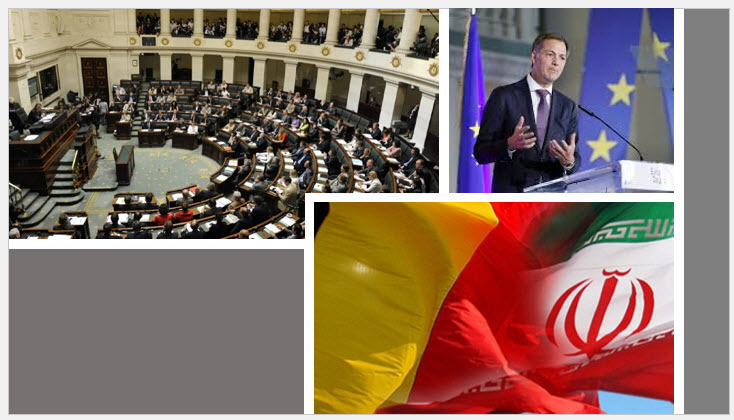
Opponents of the “Transfer for Sentenced Persons” treaty are understandably concerned that Assadi’s release could provide the Iranian regime with clear incentives to ramp up its practice of hostage-taking.
This week, a treaty was ratified by the Belgian parliament, which will likely pave the way for the exchange of an Iranian terrorist for a Belgian national who is a hostage in the Islamic Republic. Olivier Vandecasteele was detained by Iranian authorities in February, roughly a year after a Belgian court sentenced the Iranian diplomat Assadollah Assadi to 20 years in prison for organizing a plot to bomb an opposition gathering in Iran close to Paris in 2018.
Opponents of the “Transfer for Sentenced Persons” treaty are understandably concerned that Assadi’s release could provide the Iranian regime with clear incentives to ramp up its practice of hostage-taking. The timing of the arrest left little doubt about Tehran’s intention to link the cases.
According to reports, the treaty was signed after bilateral talks between the foreign ministers of Iran and Belgium on the sidelines of the Munich Security Conference, which took place about four months ago.
During those meetings, Hossein Amir-Abdollahian reiterated long-standing calls for Assadi’s immediate and unconditional release, according to Iranian state media, and provided his Belgian counterpart with the regime’s “position and views” on the Assadi case.

The Belgian government’s choice to withhold information about the treaty until it was introduced to parliament at the end of last month was undoubtedly influenced by its awareness of these worries.
Assadi and his handlers in Tehran have been making the claim that he is entitled to total immunity regardless of the place or the seriousness of his crimes ever since his arrest because his actions were done so while under diplomatic cover.
The Belgian-Iranian treaty effectively grants that immunity posthumously by permitting the return of an Iranian national detained in the Belgian prison system to his country of origin, where authorities are expressly empowered to pardon him upon arrival. That is precisely what the regime will do if the treaty is fully implemented, as Tehran’s persistent narrative regarding this case should make clear.
Even though 79 of the 131 members of the Belgian parliament voted in favor, the implementation is still not guaranteed. The National Council of Resistance of Iran’s (NCRI) pledge to keep pursuing legal actions and political action to block Assadi’s transfer may be the main cause of lingering skepticism.

The Belgian-Iranian treaty effectively grants that immunity posthumously by permitting the return of an Iranian national detained in the Belgian prison system to his country of origin, where authorities are expressly empowered to pardon him upon arrival.
“Any relocation of criminals that are responsible for terrorism and human rights violations, without serving legally mandated punishment, is to encourage and offer a ransom for terrorism and human rights violations and a breach of international laws,” said NCRI President-elect Maryam Rajavi.
Endorsement of that coalition generally implies deep dissatisfaction with current policies toward the Islamic Republic. Various Western countries, both individually and collectively, have been accused by NCRI officials of “appeasing” the theocratic regime in an effort to promote internal reform. One of the most compelling recent examples of this phenomenon is the indignation over the Belgian treaty, which emphasizes appeasing actions in response to what might have been the worst foreign-affiliated terrorist attack on Europe.
Assadollah Assadi’s trial proved that he was not working as a rogue agent and that officials at the top of the political hierarchy had specifically ordered him to target Mrs. Rajavi and the NCRI. So, using a diplomatic pouch, Assadi smuggled 500 grams of high explosives and a detonator into Europe on a commercial flight before passing it on to two accomplices.
According to experts who testified, the explosives in question could have killed hundreds of people in the initial explosion, which would have undoubtedly sparked a stampede that could have resulted in thousands of deaths. An estimated 100,000 people, including many of the aforementioned American and European supporters, participated in the 2018 Free Iran World Summit.
The Belgian treaty, which paves the way for Assadi’s release after only four years of serving his unquestionably well-deserved 20-year sentence, is exactly the kind of policy that the NCRI has criticized for seeming to downplay the significance of such a plot. Others have argued and will continue to argue that his release is required to free Belgian aid worker Vandecasteele from circumstances that have already had a significant negative impact on his health and wellbeing. There are other ways to achieve that goal, though they are regrettably poorly managed by Western policymakers.
The NCRI and its supporters have long argued that the only way to stop nefarious actions like hostage-taking is to exert intense pressure on regime institutions. However, the only way to permanently put an end to those actions is through a regime change.

